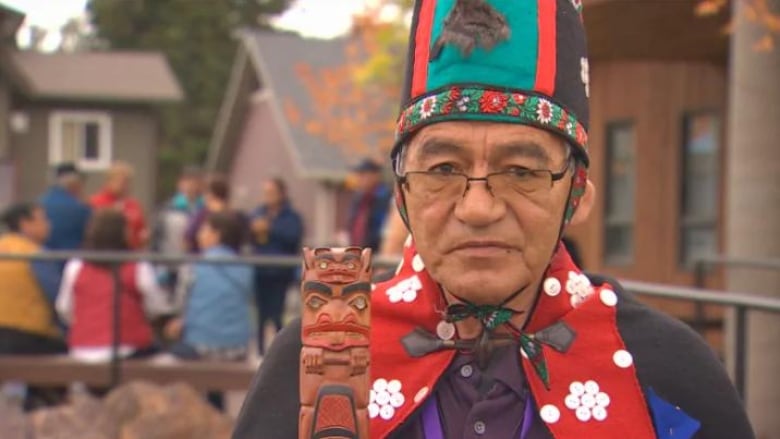Amnesty International report pans Canada's record on Indigenous rights
Canada is 'significantly failing' on multiple fronts, says
official with NGO in Canada
Global non-governmental organization Amnesty International is denouncing Canada's record on Indigenous rights as it releases its latest annual analysis on the state of human rights worldwide.
In the report released on Monday, the Nobel Peace Prize-winning organization expresses concern that Indigenous people in Canada continue to face territorial expropriation, resource extraction without consent, widespread inequality, systemic discrimination and repression by the state.
"The rights of Indigenous peoples remain a major concern and a grave concern for us," said Ketty Nivyabandi, secretary general for Amnesty's Canadian branch in Ottawa, in an interview.
"We see Canada significantly failing in its obligations to uphold the rights of Indigenous peoples, but also to tackle the climate crisis and to fully support refugees and migrants."
The group releases a version of the report every year, offering a snapshot of human rights conditions in countries all over the world. The 2022-23 report says that in Canada "The right to assembly was often under threat, particularly for Indigenous land defenders," adding that "authorities failed to mitigate the climate crisis," which also impacts Indigenous people.
Amnesty says it's concerned about anti-Indigenous racism, reports of forced or coerced sterilization of Indigenous women, the persistence of long-term boil water advisories, the legacies of colonialism and the lack of access to education and health care.
It follows a similar report from the United Nations special rapporteur on the rights of Indigenous peoples, who said earlier this month that Indigenous people face "serious obstacles" to fully enjoying their human rights in Canada.
The international censure is "putting Canada on the world map when it comes to human rights violations, which may not be something many Canadians are used to," said Nivyabandi, a Burundian poet who has resided in Canada since 2015.
Amnesty says it's specifically concerned about the criminalization of Wet'suwet'en members who oppose the Coastal GasLink pipeline, a $14.5-billion project that would carry natural gas from northeast British Columbia to an export facility on the coast.
While five of six Wet'suwet'en bands have signed on to the project, the report says the pipeline is proceeding without consent of Wet'suwet'en hereditary chiefs, who have never surrendered jurisdiction to the nation's 22,000 square kilometre territory.
Amnesty also notes that Wet'suwet'en members are suing Coastal GasLink and the RCMP over allegations of intimidation and harassment, allegations that both have denied.
Na'Moks (John Ridsdale), a Wet'suwet'en hereditary chief who opposes the project, said in an interview the report "clearly states that the democracy of this country is being weakened" by the pursuit of profit.
"The government is steered by an industry — creates arms of the RCMP to support industry," he said, referring to the Community-Industry Response Group, a unit created in 2017 to address what the RCMP calls "energy industry incidents."
Na'Moks, who raised the same issues with the UN envoy, said the international criticism has real consequences, pointing to Canada's failure to secure a seat on the UN Security Council in 2020 as an example.
"When they keep saying this is one of the most democratic and free countries in the world, and yet their actions aren't proving it, the world should be told that," said Na'Moks.
"Canada has to be held accountable."
An 'international lens'
In an accompanying news release, Amnesty also criticizes the federal and B.C. governments for continuing "to violate the rights of the Tsleil-Waututh Nation" by supporting construction of the Trans Mountain pipeline expansion.
Like Coastal GasLink, Trans Mountain has signed benefit agreements with the majority of bands along its 1,150-kilometre proposed route from Edmonton to Burnaby near Vancouver. The project has seen its expected cost soar to $30.9 billion.
The Tsleil-Waututh Nation has objected to the project since it was first proposed and, along with other groups that oppose it, has tried ultimately without success to stop it through the courts.
Rueben George, manager of Sacred Trust, the Tsleil-Waututh Nation's initiative to stop the expansion, said the nation is taking its case international after domestic routes failed. He likewise pointed to Canada's failure to secure a seat on the UN Security Council to suggest the country's failure to impress international human rights monitors has consequences.
"It's not as rosy as it seems," said George in an interview.
"They pull the wool over Canadians' eyes so that we need an international lens to look at it to give people a chance to create their opinion."
Nivyabandi said Amnesty is urging the government to act fast and stop the trend.
"What we hope to do through this report is to shed light on these major gaps that Canada has and really to push authorities to do what they have to do," she said.
"They've committed to upholding human rights, and you can't pick and choose what rights you uphold and when you do so."
CBC News has contacted Crown-Indigenous Relations and Northern Affairs Canada seeking comment.



No comments:
Post a Comment